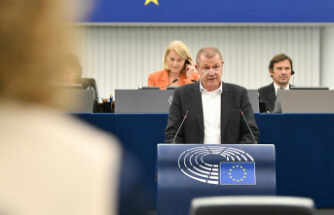Anyone who wants to take a vacation from the pandemic is currently in good hands in Austria. At the beginning of August, the neighboring country shifted down another gear in the fight against the virus: By regulation, the Austrian Ministry of Health suspended the obligation to quarantine people who tested positive for Corona and were symptom-free if they were wearing an FFP2 mask. This applies to all professions and activities – including in the medical field.
Austria has thus implemented what is being demanded by some representatives in the health sector in Germany. For example, Andreas Gassen, Chairman of the Board of Directors of the Association of Statutory Health Insurance Physicians, called for an end to the obligation to isolate last week in view of the staff shortages in the hospitals. Headwind came from Karl Lauterbach (SPD). “Infected people must stay at home,” the Federal Minister of Health made clear.
What happens when nurses and doctors who test positive work shifts in the hospital can now be admired in Austria – at least in some federal states. Because the regulation at the end of isolation is by no means implemented uniformly. While hospital staff suffering from Corona are still not allowed to go to work in some federal states, this has been possible in other federal states since the beginning of August.
The different implementation of the regulation makes it difficult for both the medical staff and the patients to get an overview of what actually applies in which federal state and hospital. Professional associations of doctors and nurses also vehemently criticize the end of the obligation to isolate. You see the well-being of the patient at risk.
How differently the regulation is interpreted at the end of the quarantine can be seen, for example, in the neighboring federal states of Vienna and Lower Austria. For example, hospital employees in the Austrian capital are still not allowed to come to work with a positive test, regardless of whether they have symptoms or not. This is handled quite differently in Lower Austria. The Lower Austrian State Health Agency announced that asymptomatic employees who tested positive for SARS-CoV-2 can start work “if they meet certain hygienic requirements”.
For example, infected doctors and nurses in Lower Austria’s clinics would have to wear masks all the time. In addition, they would not be used in particularly sensitive areas. "These employees may not be deployed in areas with immunocompromised patients, such as in oncology, in dealing with transplant patients, in intensive care units, but also in neonatology," says the state health agency. Infected people with symptoms, on the other hand, should only start work if they can show a negative PCR test result.
In Salzburg, too, Covid-positive employees without symptoms should in principle be able to work in hospitals. However, contact between infected people and patients there should be avoided on all wards. Carinthia handles things similarly. In addition to Vienna, Styria and Burgenland are also opposed to the use of symptom-free infected people. In Upper Austria, employees who have tested positive should only be deployed in exceptional cases. Vorarlberg does not want to use infected staff for the time being, but reserves the right to do so.
In the state of Tyrol, on the other hand, it is still largely unclear what to expect from clinic staff and patients. Tirol Kliniken, operator of the Innsbruck University Hospital, for example, only wants to “determine in the course of the week how exactly we will deal with the new regulation”. However, it is clear that sick people with symptoms are not allowed to go to work.
At the same time, Tirol Kliniken emphasizes that the regulation would "certainly give the hospitals some flexibility". The operator speaks of a "challenging situation" for the clinics in view of sick employees, the holiday season and the general labor market situation.
The Austrian Health and Nursing Association, on the other hand, is “not happy” with the end of the isolation requirement for hospital employees. According to the President of the Association, Elisabeth Potzmann, the new ordinance for staff is a complete paradigm shift from the rules previously in force.
“Of course, the transmission of infection, also by the staff, can never be completely ruled out. But deliberately sending positively tested staff to sick and vulnerable people has a completely different dimension," Potzmann told WELT. According to Potzmann, many nurses would not want to work if they were infected “because the fear of infecting someone” would be very stressful.
The Austrian Health and Nursing Association explicitly addresses the patients. "We advise people in need of care and their relatives to explicitly communicate that they do not want to be cared for by infected staff," says Potzmann. She assumes that the carriers will also comply with these requests. Because: "Ultimately, this is also about liability issues."
The end of the obligation to isolate is also rejected by the Austrian Medical Association. Its Vice President Harald Mayer criticized the regulation on the ORF broadcaster Ö1 as a "mixture of irresponsibility, negligence, and it's probably on the verge of physical harm to non-sick people". Mayer assumes that the health system will be overwhelmed again in the fall. Because even asymptomatic employees can infect colleagues, which can lead to even more staff absences.
In contrast to doctors and nurses, corona-positive relatives are still prohibited from entering hospitals and nursing homes under the new regulation. After all, this rule applies uniformly in all federal states.
"Everything on shares" is the daily stock exchange shot from the WELT business editorial team. Every morning from 7 a.m. with our financial journalists. For stock market experts and beginners. Subscribe to the podcast on Spotify, Apple Podcast, Amazon Music and Deezer. Or directly via RSS feed.












